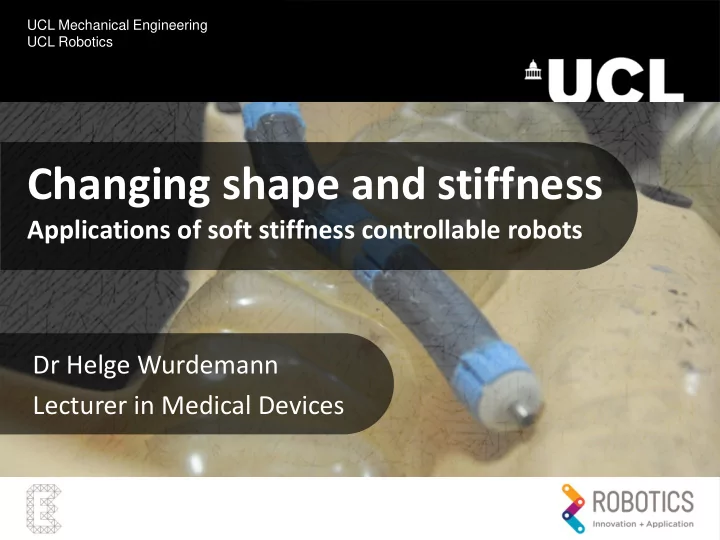

UCL Mechanical Engineering UCL Robotics Changing shape and stiffness Applications of soft stiffness controllable robots Dr Helge Wurdemann Lecturer in Medical Devices
Current Surgical Robotic Systems Image source : www.dezeen.com - The Miro Surge system
da Vinci Surgical Robot
ALF-X Surgical Robotic System by TransEnterix
Raven – An open source robot-assisted surgical system
German Aerospace Center
FRK – Robin Heart PVA
Dexterity constraints of rigid-link robots • It can be problematic to change surgical targets inside the abdomen, and when needed to work in different anatomical districts, it can become necessary to move the entire robotic trolley. • Difficulties with the positioning of current camera systems often lead to a suboptimal visualization of the field ‐ surgical manoeuvres may be influenced. • Usually additional support is required by a laparoscopic assistant at the patient’s side. • The current da Vinci robotic system does not provide the surgeon with haptic feedback of the handled tissues. This, added to the strong mechanical power of the robotic arms, can lead to tissue tears. • What about soft systems? Or even soft-stiff systems?
Research at the #SoftHapticsLab Haptic Soft, devices stiffness- controllable robots #SoftHapticsLab Pseudo Soft tissue haptics sensing
STIFFness controllable Flexible and Learnable manipulator for surgical OPerations January 2012 to December 2015 Coordinator: Professor Kaspar Althoefer Queen Mary University of London Technical and project manager: Dr Helge Wurdemann
The STIFF-FLOP consortium Scientific Experts from Biology Scientific Scientific Experts from Experts from Medicine Engineering
Total Mesorectal Excision (TME) based on presentation by Prof Alberto Arezzo, University of Turin
’ PO Total Mesorectal Excision (TME) based on presentation by Prof Alberto Arezzo, University of Turin A number of access points fairly wide-spread across the abdomen are needed. Employing da Vinci requires frequent repositioning of overall system as well as human assistance near the patient.
Procedure Elements (TME): • Mobilization of Splenic Flexure • Mobilization of Sigmoid Colon / Toldt Fascia • Incision of Pelvic Peritoneum • Ligation of Inferior Mesentric Artery (IMA) • Mobilization of Left Colon / Gerota Fascia • Ligation of Mesentric Vein • Posterior TME • Lateral TME • Posterior TME (2) • Anterior TME (Male/Female) • Section of Rectum • Anastomosis
Posterior TME
Soft, Stiffness-controllable Robots Image source : DKFindout.com
STIFF-FLOP Manipulator Design Distal joint Omni-directional bending CURRENT DIMENSIONS MATERIALS - Silicone Unit: 0030 EcoFlex - Sheath: PET - Stiffening chamber membrane: Latex - Granular matter: Coarse Coffee OVERALL STRUCTURE 3 chambers for fluidic Actuation Actuation Stiffening Stiffening system
STIFF-FLOP Manipulator Design
Granular jamming mechanism for stiffness control
Granular jamming mechanism for stiffness control
Granular jamming mechanism for stiffness control I. De Falco, Y. Noh, H.A. Wurdemann, K. Althoefer, M. Cianchetti, A. Menciassi, submitted to Smart Material and Structures, 2016.
Challenges • Actuation/sensor interference (drastically changes the reading!). • Chamber cross-section area changes (nonlinear actuation). • Chamber geometrical centers shifted inwards • Resulting bending moment smaller.
Flexible and High Dexterous 2-module Soft Robot
Flexible and High Dexterous 2-module Soft Robot A. Arezzo et al., Total Mesorectal Excision using a soft and flexible robotic arm: a feasibility study in cadaver models, Surgical Endoscopy, 2016.
Antagonistic actuation principle Air Compressor Input device Push & Pull Antagonistic System Section A : A Pressurised Air (pushing) A Pressurised Chamber 1 [bar] Internal Pressure Latex Bladder A Ambient Pressure Fabric Sleeve Sleeve Reaction Force Tendons (pulling) Motors A. Stilli, H.A. Wurdemann, K. Althoefer, IEEE/RSJ IROS, 2014. F. Maghooa, A. Stilli, K. Althoefer, H.A. Wurdemann, IEEE ICRA, 2015.
Antagonistic actuation principle A. Stilli, H.A. Wurdemann, K. Althoefer, IEEE/RSJ IROS, 2014. F. Maghooa, A. Stilli, K. Althoefer, H.A. Wurdemann, IEEE ICRA, 2015.
Antagonistic actuation principle A. Shiva, A. Stilli, Y. Noh, A. Faragasso, I. De Falco, G. Gerboni, M. Cianchetti, A. Menciassi, K. Althoefer, H.A. Wurdemann, IEEE RA-L, 2016.
FourbyThree
Variable stiffness link A. Stilli, K. Althoefer, H.A. Wurdemann, Soft Robotics, 2016.
Variable stiffness link A. Stilli, K. Althoefer, H.A. Wurdemann, Soft Robotics, 2016.
Innovative Haptic Technology Image source : MIRAISENS Inc.
Haptics of RMIS Master console Slave robot No sense of touch Image source : Intuitive Surgical Patient Surgeon M. Li, J. Konstantinova, A. Jiang, H. Liu, T. Nanayakkara, L.D. Seneviratne, P. Dasgupta, G. Mehra, K. Althoefer, H.A. Wurdemann, Medical & Biological Engineering & Computing, 2015.
Innovative Haptic Technology Master side Slave side M Li, T. Ranzani, S. Sareh, L.D. Seneviratne, P. Dasgupta, H.A. Wurdemann, K. Althoefer, Smart Materials and Structures, 2014 – “Highlights of 2014”
Innovative Haptic Technology - Design Methodology: • Combination of pneumatic air actuation and granular jamming. • coffee powder inside a latex membrane → low hysteresis, high stiffness Concept Design M Li, T. Ranzani, S. Sareh, L.D. Seneviratne, P. Dasgupta, H.A. Wurdemann, K. Althoefer, Smart Materials and Structures, 2014 – “Highlights of 2014”
Innovative Haptic Technology - Analysis FE-Modelling Experimental analysis
Innovative Haptic Technology - Results • Sensitivity Se : a measure of the test's ability to identify positive results. • Specificity Sp: a measure of the test’s ability to correctly identify negative results. • Positive predictive value PPV: the proportions of positive results that are true positive results. • Accuracy ACC M Li, T. Ranzani, S. Sareh, L.D. Seneviratne, P. Dasgupta, H.A. Wurdemann, K. Althoefer, Smart Materials and Structures, 2014 – “Highlights of 2014”
Soft Haptic Screen
Soft Haptic Screen
Thanks to
Thanks. Thank you. Dr Helge Wurdemann @h_wurdemann softhaptics.website h.wurdemann@ucl.ac.uk
Recommend
More recommend